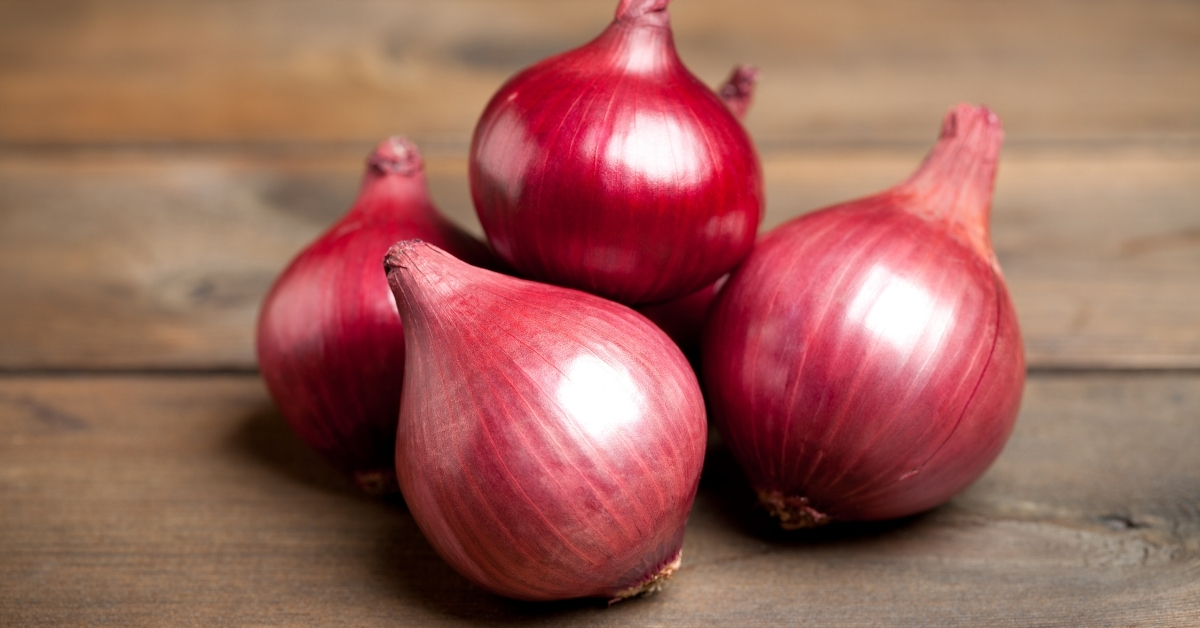The simple onion has long been a staple in Indian kitchens, appearing in almost every household dish. Onions have been an essential part of our diet for centuries, used by our ancestors in age-old culinary traditions. For example, mixing leftover fermented rice with buttermilk, chopped onions, and chillies created a simple yet highly nutritious meal that supported digestion and overall health. This daily practice shows how onions were naturally integrated into a healthy diet long before modern nutrition science. Even today, in modern kitchens and Western cooking, onions remain ever-present, enhancing sandwiches, curries, stir-fries, soups, and more with their distinctive flavour, texture, and aroma. While we may take this everyday kitchen hero for granted, the onion offers remarkable Ayurvedic benefits that go far beyond taste. Let’s explore what Ayurveda has to say about this incredible bulb and the ways it can enhance our health and wellbeing.
Ayurvedic Properties of Onion (Allium cepa)
Onion, known in Sanskrit as Palandu is highly valued in Ayurveda for its unique qualities.
- Taste: Pungent with hints of bitter and sour
- Potency: Hot stimulates digestion and circulation
- Post-Digestive Effect: Sweet, supports nourishment and tissue strength
- Qualities: Sharp, unctuous, heavy
- Effect on Tridosha: Balances Vata, neutral on Pitta, slightly increases Kapha
Cokked Onion is Milder, sweeter, easier to digest not hot as raw ones pacifies doshas and doesn’t increase kapha as Raw onion does. It still retains beneficial properties.
Types of Onion (Ayurveda):
- White Onion: Similar qualities to garlic, improves strength, immunity, digestion, intelligence, body stability, and nourishment, used in neurological pains, sciatica, and osteoarthritis.
- Red Onion: Sweet, slightly heavy, sticky useful in bleeding disorders like nasal bleeding and piles.
- Yellow Onion: Balanced variety
- Shallots: Mild, sweet, good for gut and easy to digest.
Health Benefits of Onion
Digestive Health: Enhances digestion, relieves indigestion, bloating, and flatulence stimulates appetite.
Antimicrobial: Exhibits antibacterial, antifungal, and antiviral properties.
Anti-inflammatory & Joint Health: Reduces inflammation, relieves arthritis, rheumatism, sciatica, and gout.
Antioxidant Protection: Protects cells from oxidative stress, supports overall wellness, and may reduce risk of chronic diseases.
Cardiovascular Health: Lowers blood pressure and cholesterol protects against atherosclerosis and improves circulation.
Respiratory Health: Clears mucus, aids cough, cold, asthma, bronchitis, and sinus congestion.
Metabolic & Blood Sugar Support: Helps regulate glucose, improves insulin sensitivity, and supports diabetes management.
Skin Health: Treats acne, eczema, skin infections, and promotes wound healing.
Sexual & Reproductive Health: Aphrodisiac and used for infertility improves sperm count.
Cancer Protection: Compounds like quercetin, apigenin, and fisetin may inhibit cancer cell growth, particularly prostate cancer.
Diuretic & Detoxifying: Promotes urine production, eliminates toxins, and supports liver and kidney function.
Research-Proven Benefits
- Onion’s antioxidant and anti-inflammatory compounds have been shown to reduce the risk of cardiovascular disease and manage high blood pressure.
- Quercetin and other flavonoids help regulate blood sugar and protect against diabetic complications.
- Studies indicate anticancer properties, particularly against prostate cancer, by inhibiting cancer cell growth and inducing apoptosis.
- Anti-allergic and anti-inflammatory effects support respiratory health, including asthma management.
Home Remedies
- Digestive Health: Consume a small amount of raw onion with meals to enhance digestion and appetite.
- Respiratory Health: Prepare a decoction of onion slices with honey to relieve cough and respiratory congestion.
- Cardiovascular Health: Include raw onion in daily diet breakfast or lunch to help lower blood pressure and cholesterol levels.
- Urinary Health: Drink a decoction of onion slices boiled in water to relieve urinary tract infections.
- External use:
- Joint Pain and Inflammation: Apply a paste of crushed onion mixed with a little turmeric on affected areas to reduce pain and swelling even in fractures.
- Hair Health: Applying onion juice 10 minutes before hair wash may improve hair growth, shine, and reduce hair fall. In my experience, I have observed visible hair growth on bald head by gently scratching small pieces of onion on the scalp effective remedy.
- Skin & Local Treatments: Helps with blackheads, moles, wounds, and dental inflammation.
Onion Juice Uses
Do you know? Though onion juice may not suit everyone, it has remarkable benefits in Ayurveda. It supports digestion, boosts immunity, helps with cardiac issues, respiratory problems, improves skin health, improve vision, aids anti-aging, and strengthens the body. Even if not very palatable, it can be tried once a week or replaced with raw onion in meals for similar benefits.
Onion Tamasic Healer
In general, onions are considered Tamas-inducing, meaning they can increase restlessness, lethargy, or desire when consumed in excess. Because of this quality, they are traditionally advised against for those seeking celibacy or deep meditation, as they may disturb mental focus and spiritual practices. However, they remain a powerful and nutritious ingredient for maintaining overall physical wellness.
Conclusion
Onion is truly a kitchen hero, cherished in diets for all ages to promote overall health. Our ancestors long recognized its benefits, using it in daily meals let us continue and pass to generations. Even today, its sulfur-rich compounds make it a favourite in hair rejuvenation treatments and beauty clinics for natural skin healing. By embracing onions whether raw, cooked, or as shallots we can elevate our health, beauty, and wellbeing. Adding this to our diet is a simple, age-old way to live stronger, healthier, and feel naturally revitalized.






